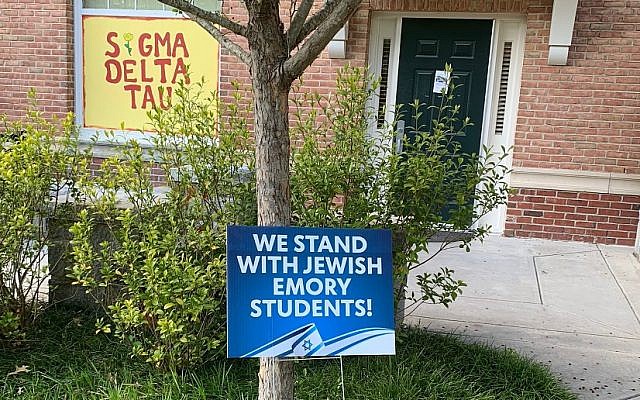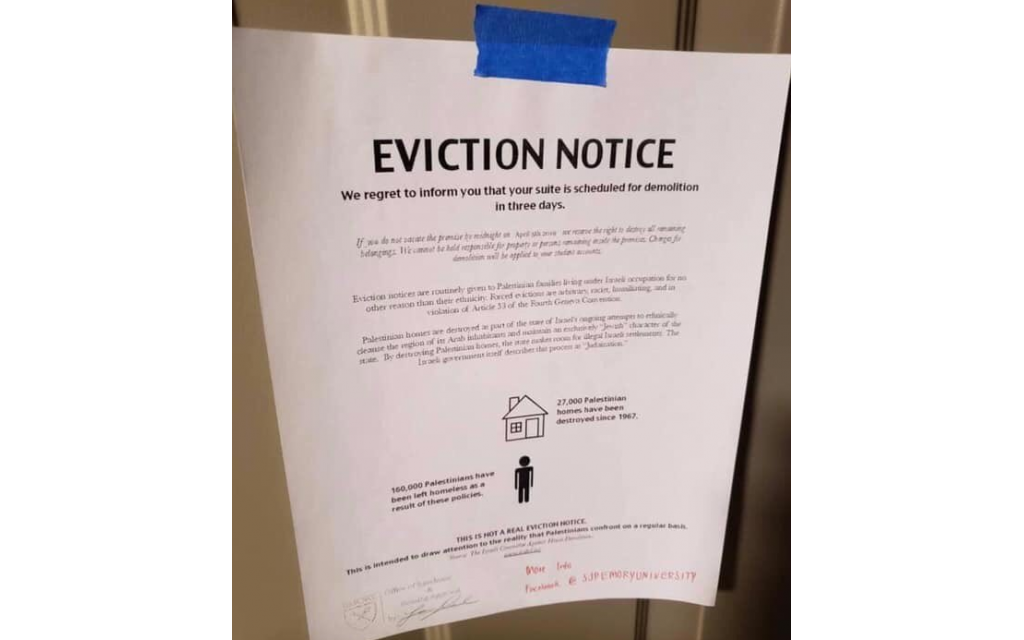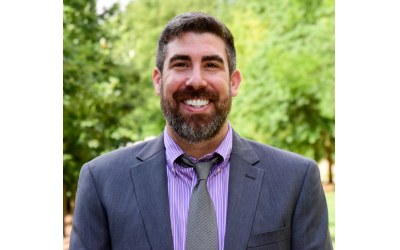Emory Pro-Palestinian Students Call to Boycott Jewish Organizations
Many cooks stirring the pot as Emory's "Eviction Notice" turmoil heats up with pro-Palestinian student demanding the boycott of Jewish organization.
Dave Schechter is a veteran journalist whose career includes writing and producing reports from Israel and elsewhere in the Middle East.

Emory University is trying to lower the heat under a stew of emotions fueled by acrimony between pro-Israel and pro-Palestinian students.
University officials have walked a tightrope in their public statements, in effect acknowledging that both sets of students feel aggrieved and hoping that the “eviction notice” incident that occurred April 2 will lead to dialogue, rather than further vitriol.
But as last week ended, no party to the dispute seemed satisfied with the university’s response, which the Anti-Defamation League called “slow and inadequate.”
Jewish organizations on- and off-campus urged the university to punish Emory Students for Justice in Palestine, the group that posted the fake notices on dormitory doors on the Emory Clairmont Campus, at the Woodruff Residential Center, and at the off-campus Emory Point apartments.
Pro-Palestinian students, contending that “right-wing extremist groups are smearing student activists,” called for the university community to boycott several Jewish organizations on the Emory campus.

“We call on Emory University to cease validating the bigoted smear campaign and to discipline students and other Emory community members that are complicit in the ongoing harassment. We further call on all community members to avoid endorsing or co-sponsoring events and activities with Emory Hillel, the Zionist Organization of America, EIPAC [Emory Israel Public Affairs Committee], Emory Eagles for Israel, Emory Chabad or others complicit in this activity until they rescind and curtail their ongoing harassment campaign,” said a statement by the Emory Students for Justice in Palestine on April 5, which was followed by the names of dozens of supporters from inside and outside the university.
The flyers appeared during an annual Israel Apartheid Week protest on campus. Similar flyers have appeared on campuses around the country in recent years. The official-looking notices advised: “We regret to inform you that your suite is scheduled for demolition in three days.”
The flyer said that “Palestinian homes are destroyed as part of the state of Israel’s ongoing attempts to ethnically cleanse the region of its Arab inhabitants and maintain an exclusively ‘Jewish’ character of the state.”
A disclaimer at the bottom advised that the eviction notice was not real.

Initial reports that Jewish students alone were targeted proved unfounded, according to the university and other sources. An estimated 17 percent of Emory’s undergraduate students and 10 percent of its graduate students are Jewish, according to the Hillel International website.
The university said that multiple departments were investigating the incident. The student newspaper, The Emory Wheel, said that included campus police.
Israel Apartheid Week coincided with Emory Israel Week, whose organizers, the Emory Eagles for Israel, complained that pro-Palestinian protests, including a symbolic “die-in,” took place adjacent to their events.
The university’s response was complicated by the flyers initially having been approved by the Emory Residence Life office, which later ordered them removed because they violated a policy against posting on doors without student consent. The management at Emory Point also had the flyers removed.
Emory University President Claire E. Sterk, in a statement issued April 5, acknowledged that “this week’s events exposed several flaws in our process for the approval, authorization, and distribution of flyers.”

“Emory’s commitments to creating an environment where all members of the community feel safe and protected and to upholding free speech and vigorous debate remain unquestioned. Emory stands firm against all forms of racism and intolerance,” Sterk said.
The university president went on to say, “I apologize for any part that Emory has played in causing pain to members of our community and those beyond our campus. That is the last thing I would want for anyone who visits, lives, works, or studies at our university. … As we have done in the past, I hope we can agree that the complex issues facing our world today summon us to be citizens of reason and respect, of rational debate and compassion.”
Sophia Weinstein, co-president of Emory Israel Public Affairs Committee, told the Atlanta Jewish Times, “There hasn’t been much dialogue” between the Jewish student groups and the pro-Palestinian students, who have become more organized in recent years. “We’re completely up for dialogue. We’ve asked for dialogue. We want dialogue. It’s fundamental to being a college student.”
The chances for dialogue may not have been enhanced by statements issued April 5 by the opposing factions.

In his statement, Rabbi Russ Shulkes, executive director of Hillels of Georgia, outlined “What we at Hillel would like to see, …”
Among those items were: “The Emory SJP chapter punished. They should not just receive a slap on the wrist for putting up a flyer in the wrong place. They purposefully flouted their responsibilities of an Emory club in good standing. … SJP’s Emory University adviser should resign, or be asked to resign and the university should assign another adviser. … SJP should, at the very least, be on probation for at least one year.”
A statement endorsed by seven communal organizations said: “The Atlanta Jewish Community stands with Emory’s Hillel, which has stated emphatically that what happened is more than a policy infraction. The nature and language in the notices was threatening, potentially violating students’ fundamental sense of safety. The content is unambiguously hateful with clear anti-Semitic overtones. We call upon Emory University to apply serious consequences and strongly demonstrate that it will take steps to prevent similar actions in the future.”

Those organizations were the Jewish Federation of Greater Atlanta, Jewish Community Relations Council, Anti-Defamation League, American Jewish Committee, Israel American Council, Hillels of Georgia, and the Atlanta Rabbinical Association.
Meanwhile, two congregations, Beth Jacob Atlanta and Young Israel of Toco Hills, distributed 300 yard signs that read “We Stand With Jewish Emory Students!”
“This project is a simple message of support from individual Jews to each other expressing solidarity. It is communicating to students that even if they feel intimidated by their peers and disappointed by their school administration, they still can count on hundreds of their neighbors who they may have never even met who are willing to publicly stand shoulder to shoulder with them,” said Rabbi Yitzchok Tendler, Beth Jacob’s executive director.
- Emory hillel
- Rabbi Russ Shulkes
- Israel
- Students for Justice in Palestine
- Emory University Hillel
- Emory University
- Breaking News
- Jewish Community Relations Council of Atlanta
- jewish federation of greater atlanta
- Anti-Defamation League
- American Jewish Committee
- Israel American Council
- Jewish Education
- News
- Hillels of Georgia
- Anti-Semitism
- Middle East
- Anti-Israel
- Anti-Zionism
- Emory Eviction Notice
- Emory-Israel Public Affairs Committee
- Rabbi Yitzchok Tendler
- Claire E. Sterk
- Israel Apartheid Week
- Emory Israel Week
- Congregation Beth Jacob
- Young Israel of Toco Hills
- Dave Schechter
- Sophia Weinstein



comments